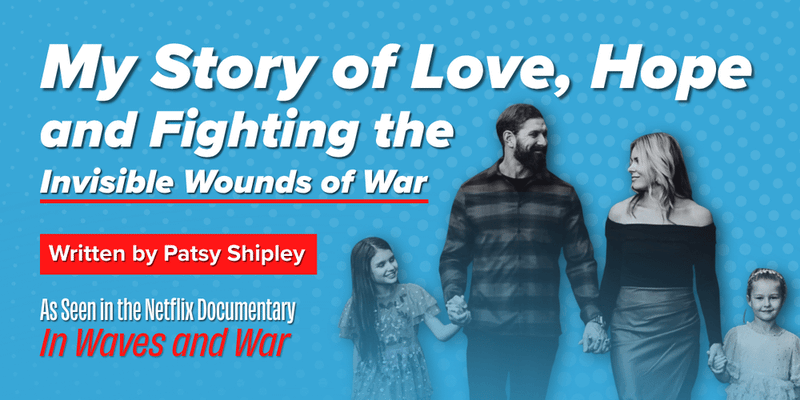By Patsy Shipley
They say war changes people. What they don’t say is how much it changes the ones waiting at home.
For years, I watched my husband, DJ, struggle under the weight of invisible wounds. He came home from combat physically whole, but mentally, emotionally, and spiritually wrecked. And I had no idea how to reach him.
We looked strong from the outside - smiling in photos, our beautiful daughters in tow, always appearing together. But behind closed doors, we were barely holding on.
DJ wasn’t the same. He was withdrawn. Numb. Not just to me, but to life. I was losing the man I married one piece at a time. And the worst part? I didn’t know how to stop it. I didn’t know how to help him.
Living in the Quiet Breakdown
Nobody talks about what it’s like to love someone with TBI or PTSD. There’s no manual for what to do when the person you love starts slipping away, even though they’re still right in front of you.
He wasn’t yelling. He wasn’t violent. But the silence was brutal. The distance. The detachment. I became scared to say the wrong thing - scared that one more heartbreak might push him past the edge.
I wasn’t angry. Not at him, not even at the war. What I felt was more like exhaustion and fear tangled together. The war didn’t just end when he came home - it followed him through the door and settled into our lives. I watched him struggle and didn’t know how to help.
I was tired. Pretending everything was fine. Smiling at neighbors. Showing up for our kids. Holding it together for a man who felt like a stranger in his own skin.
The Call That Changed Everything
When DJ hit his lowest point, I knew I couldn’t fix him. But I also couldn’t let him go without trying one more thing.
I reached out to VETS . I talked to Amber Capone , and for the first time in a long time, I didn’t feel alone.
We took a leap of faith with psychedelic-assisted therapy. It wasn’t an easy decision. It was terrifying. But so was the thought of doing nothing and losing him forever.
When he came back from treatment, something shifted. Not everything was fixed - but he was here. Present. Soft again. Laughing. Holding our daughters like they were made of gold.
And I exhaled for the first time in years.
The Part No One Sees
What people don’t tell you is that when your partner heals, you still have healing to do too.
So I started doing my own work - not just therapy or routines, but the kind that comes from finally letting myself be human again. I let the tears come, and I let myself feel everything I had buried just to hold it all together. I gave myself grace. I learned to love myself again, to remember who I was beyond the chaos and survival.
He was home. And for the first time, my fight to keep us afloat was over- and mine to heal had just begun.
Telling Our Story
Sharing this in In Waves and War wasn’t easy. It meant ripping open wounds I thought I’d already stitched shut. Watching footage of the darkest chapters of our lives was like bleeding in front of strangers.
But it also gave meaning to the pain. If one woman out there sees this and realizes she’s not alone or broken - if one family finds their way to healing - then every tear was worth it.
If You’re in It Too
If you’re living in that quiet chaos, walking on eggshells, holding your breath, waiting for the next emotional landmine - I see you. I’ve been you.
You are not weak. You are not alone. And you don’t have to carry it all by yourself.
Ask for help. Scream if you need to. Cry in your car. Take a break. Do whatever it takes to keep your light on, because love is worth it. Healing is possible. And there is life on the other side of the storm.
About the Film
In Waves and War is a documentary telling the raw and real stories of veterans and families navigating trauma, healing, and hope through psychedelic-assisted therapy.

